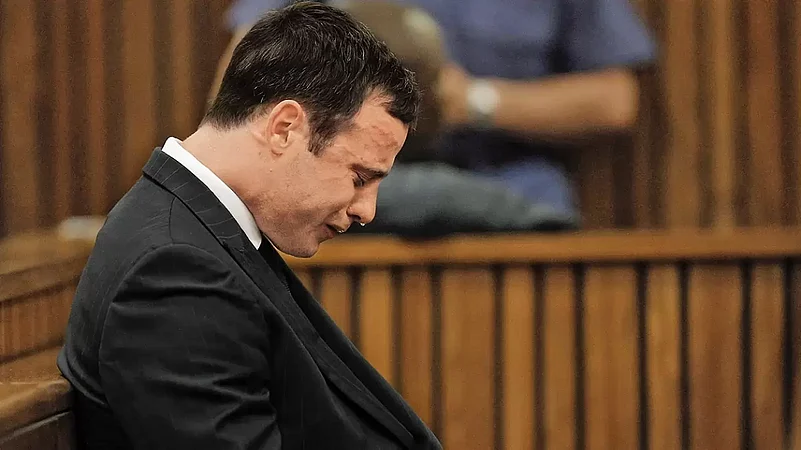Oscar Pistorius could be granted parole on Friday after spending nearly 10 years in prison for murder. (More Sports News)
It's the latest turn in the story of the double-amputee Olympic runner who was one of the world's most admired athletes before he killed his girlfriend by shooting her multiple times through a toilet door at his home.
Pistorius, who had his 37th birthday this week, was sent to prison in late 2014 and has been given a second chance at parole in the space of eight months after he was wrongly ruled ineligible for early release at a first hearing in March. That was due to an error made by an appeals court over when Pistorius' jail sentence officially started and if he'd served the required time.
He was initially convicted of culpable homicide — a charge comparable to manslaughter — for killing Reeva Steenkamp in the predawn hours of Valentine's Day 2013. That conviction was overturned and he was convicted of murder after an appeal by prosecutors. They also appealed against an initial sentence of six years for murder and Pistorius was ultimately sentenced to 13 years and five months in prison.
Serious offenders in South Africa must serve at least half their sentence to be eligible for parole, which Pistorius has done.
Pistorius testified at his murder trial that he killed Steenkamp by mistake and thought she was a dangerous intruder hiding in his bathroom in the middle of the night when he fired four times through the door with his licensed 9 mm pistol. Prosecutors argued that Steenkamp had fled to the toilet cubicle during a late-night argument and Pistorius killed her in a rage.
Pistorius was eventually convicted of murder on a legal principle known as dolus eventualis, which means he acted with extreme recklessness and should have known that whoever was behind the door would likely be killed. It's comparable to third-degree murder.
The killing happened when Pistorius was at the height of his fame and just months after he had become the first double-amputee to compete at the Olympics. He was also a multiple Paralympic sprinting champion and one of sport's most marketable figures having overcome the amputation of both his legs below the knee as a baby to run on specially designed carbon-fiber blades.
At his sensational murder trial — which was carried by TV channels across the globe — prosecutors argued there was another side to Pistorius' life that involved guns, nightclubs and angry confrontations with others. Pistorius was also found guilty of a second charge of recklessly firing a gun in a restaurant.
Steenkamp's mother, June Steenkamp, will not oppose Pistorius' parole, her lawyer said in a message to The Associated Press. Steenkamp's father, Barry Steenkamp, died in September and the mother's decision to not oppose Pistorius' early release is an apparent softening of the family's position.
June and Barry Steenkamp gave an interview to a British newspaper in February for the 10th anniversary of their daughter's death and said that they had not forgiven Pistorius for killing her, still believed he shot her intentionally in anger, and wanted him to stay in prison for the rest of his life.
Reeva Steenkamp was a 29-year-old model and reality TV star.
June Steenkamp attended Pistorius' first parole hearing in March to oppose Pistorius' release but will not attend on Friday, said her lawyer, Tania Koen. A lawyer will read out a statement from June Steenkamp at this hearing, Koen said.
It's not guaranteed that Pistorius will be released when he appears before the parole board in Pretoria.
Parole boards take a wide range of factors into account, including the offender's conduct in prison, their mental health, and any risk posed to the community by their release. They also have various versions of parole available to them. Pistorius could be released on full parole or day parole, where he can live and work in the community but must return to prison at night.
The Department of Corrections said if Pistorius is granted parole, he might not be released immediately and it is up to the parole board “to work out the placement date should an inmate be declared ready to be placed on parole.”
Pistorius was initially sent to Pretoria's central prison, a notorious apartheid-era jail. He was moved to the city's Atteridgeville Correctional Centre in 2016.
There have been only occasional glimpses of Pistorius' life behind bars over the last decade. His father has said he has been holding bible classes for fellow prisoners, although there have also been flashes of trouble, including an altercation Pistorius had with another inmate over a prison telephone that left him requiring medical treatment.





















